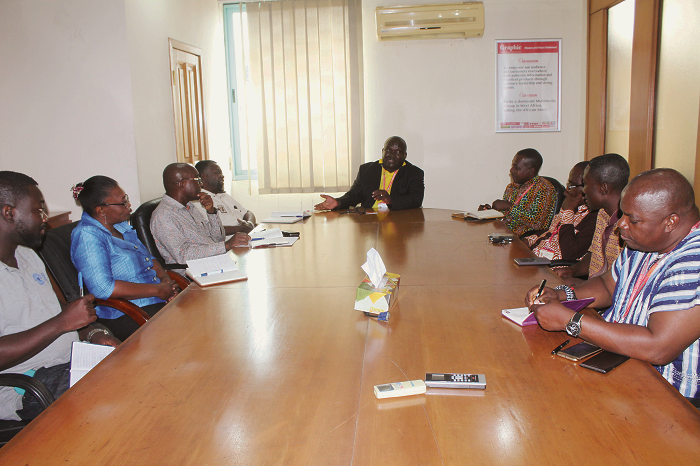
GhIE to launch ‘Engineers Bible’ to find solutions to key national challenges
The Ghana Institution of Engineers (GhIE) has advanced plans to launch the “Engineers’ Bible”, a document that contains expert knowledge and solutions to key national development challenges.
Advertisement
It said those challenges included perennial floods, power outages and poor roads and indicated that the engineering fraternity should no longer sit aloof for things to get out of hand.
The institution will also establish a National Engineering Advisory Review Council (NEARC) to provide advisory services for engineers and make inputs into government policies.
The President of the GhIE, Mr Kwame A. Boakye, disclosed this when he led the six-member executive board of the institution to pay a courtesy call on the Managing Director (MD) of the Graphic Communications Group Limited (GCGL), Mr Kenneth Ashigbey, at his office last Friday.
The visit formed part of the institution’s long-standing collaboration with the GCGL, which is targeted at opening a platform for dialogue on pressing national issues.
Mr Boakye also said the GhIE had rolled out a project called the Infrastructure Score Card to assess the potential of the country in areas such as water, energy, transportation and sanitation.
“Engineers must not only be commenting on national issues. They need to get involved in the governance of the country. When we have engineers as parliamentarians, district chief executives and ministers, they will bring their expertise to bear on policy initiatives to help transform the country,” he said.
He said from his perspective, Ghana was going nowhere because there could be no development without engineers, adding that it was a special responsibility for engineers to lead the development process.
Other Trending Stories
Engineers’ Bible
The concept of the Engineers’ Bible is to help the GhIE to develop its perspective of development, make recommendations and engage the media to put pressure on decision makers.
Mr Boakye said contrary to perceptions that engineers were doing nothing to help the development process, engineers came out with documents that were circulated to everybody but nothing happened because stakeholders, including the government, did not show interest in solving the problems.
“Engineers may be good at producing documents, but if you cannot implement what are in the documents, you have done nothing, hence the decision of the NEARC so that engineers can influence the direction of the country,” he said.
Engineers are key stakeholders
For his part, Mr Ashigbey observed that engineers played a critical role in national development for which reason they ought to lead the conversation on key policy issues.
He said it was about time professionals, including engineers, spoke out on national issues in a non-partisan manner.
“Engineers have the technical know-how and expertise to provide solutions to critical national issues. But most of the time, they leave the discussion to politicians. It should be the other way round; so, the experts must speak out,” he said.
He urged engineering institutions to support experts in public institutions who were unable to make their views heard due to structures they operated within.
Build capacity of journalists
Mr Ashigbey called on the GhIE to collaborate with media organisations to train and build the capacity of some journalists to report effectively on technical and engineering issues.
He said there was the need for an enhanced partnership between the GCGL and the GhIE to initiate dialogue sessions on topical issues to create awareness and educate the public.
“Journalists can partner engineers to break down technical jargons for the understanding of all those who must be part of the national conversation,” he said.
He said it was pathetic that the same old problems of post and immediate pre-independent Ghana kept bedeviling our society.
Mr Ashigbey said anybody who had read “Jubilee Ghana, a 50 years news journal through the Daily Graphic” would realise that the development challenges of today had all been catalogued in that book, yet nothing concrete had been done to address them.
Advertisement
“The book shows clearly that as a nation we have not moved forward,” he said.
The Director of Newspapers at the GCGL, Mr Yaw Boadu-Ayeboafoh, contended that it was not the fault of journalists when they did not communicate issues on engineering correctly, saying there was the need for capacity building for media practitioners in that regard.
“Do not get angry when sometimes we butcher your terminologies. It is just that we do not understand the technical issues,” he said.
He, however, asked journalists to take advantage of any opportunity to learn the technical language of engineers in order to communicate the issues appropriately to readers.
Advertisement
Engineers must speak out
The Editor of the Daily Graphic, Mr Ransford Tetteh, wondered whether the numerous engineering challenges facing the nation, such as perennial flooding, poor roads and other infrastructure disasters, could be attributed to engineering failure.
He charged engineers to speak up against poor infrastructure in the country, especially roads and buildings that developed cracks and potholes days after they were handed over to the government.
The President-elect of the GhIE, Ing Carlien Bou-Chedid, said most of the development challenges that confronted the country had to do with the negative attitude of the people.
She observed that until the public was educated to have attitudinal change, the problems would persist, even if engineers came out with the most potent solutions.
Advertisement
About GhIE
Officially founded in 1968 with a vision to promote engineering excellence in society, the Ghana Institution of Engineers (GhIE) replaced the Ghana Group of Professional Engineers as an autonomous, non-partisan professional body.
The Engineering Council Act 2011, Act 819 and the Professional Bodies Registration Decree NRCD143 of 1973 provide the legal authority for the institution.
The mission of the GhIE is to be the trailblazers in the development of science, engineering and technology at all levels of society, share knowledge and instil in the membership professionalism and ethical practice. It is also meant to establish structures to ensure the good corporate image of the institution at all times.




